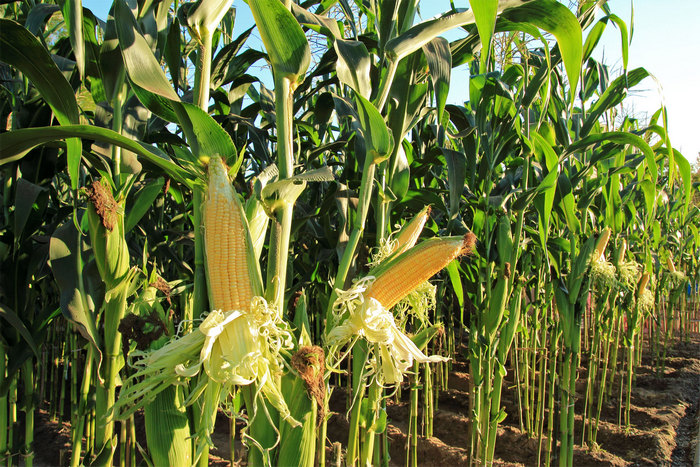New maize variety set to uplift farmers’ fortunes in western Kenya

For many years Elda Mariam, a maize farmer from Nambale sub-county, Busia County has been harvesting a maximum of Seven bags in her one-acre parcel. This could however change with the introduction of Bt Maize variety in that locality.
“Maize farming has been a big loss to me. I incur a lot of expenses including the use of chemical sprays and fertilizer, but the yield has not been good,” says disheartened Mariam.
Mariam, however, confides that with the information she has received during Bt Maize’s sensitization meeting at Alupe in Busia, she hopes for better yields.
She told Africa Science News that with the introduction of Bt Maize technology, farmers in Busia county and western Kenya have a reason to smile for the beckoning fortunes after scientists/researchers availed the new variety in the region.
Wilhelm Mukhongo is a soil expert and works with the county government of Busia, the department of agriculture, and says Busia county is food insecure because of the lack of modern agricultural technologies, post-harvest losses, and poor seed variety choices, where farmers have toiled hard but limited yields. She notes that the Bt variety is poised to increase yields in the region as a boost to the success of the National big four agenda where food and nutrition is part of.
The research to develop the new technology was undertaken by Kenya Agricultural Livestock Research Organisation (KALRO), Kenya Plant Health Inspectorate Services (KEPHIS) and ATF took 10years of extensive research over the new maize technology.
Addressing farmers and other stakeholders, during a sensitization forum at Alupe, James Karanja, maize breeder officer at KALRO Nairobi office assured farmers and other users of genetically modified organisms of their safety as well as the safety of soil living organisms against misconceptions that GMOs have health risks.
He quickly pointed out that farmers are set to realize bumper harvest after adopting the Bt Maize technology. “This technology is not a new one, it has been tried and successfully used in South Africa and the results overwhelming” reiterated Karanja.
Bt (Bacillus thuringiensis) was first used in the United States of America in 1997 and had since spread to several African countries including Kenya.
In Kenya and Uganda for instance, statistics show that Bt Maize give a positive and significant effect across varieties and trials with a 52 percent yield advantage over non-Bt maize.
Karanja observed that full adoption of the technology in Kenya could save the country a plug the 400,000 tonnes of maize imported into the country to cover up the deficit lost to stem borer pests. This is equivalent to USD. 90milion.
Karanja urged farmers like Mariam need not give up on farming asserting that biotechnology is the way to go in addressing the challenges brought along by effects of climate change, ever growing population leading to shrinking land for cultivation and biological challenges like pests and diseases and agronomical challenges, adding that biotechnology remains a strong investment for farmers globally.
In the recent past, agricultural bodies like the African Agricultural Technology Foundation with partners such as the Kenya Agricultural and Livestock Research Organisation (KALRO) have been working towards getting transgenic drought-tolerant and insect-protected maize varieties to farmers to enhance food security in sub-Saharan Africa.
“We have been researching on this new variety for the last ten years to ensure farmers who access the variety will be able to mitigate effects of climate change especially moderate drought and losses by insects such as stem borer and fall armyworm,” said Karanja.
National performance trials (NPTs) have been carried out in Kenya by the Kenya Plant Health and Inspectorate Service (KEPHIS) and KALRO to determine the agronomic potential and adaptability of new varieties relative to those currently in the market. National Biosafety Authority and NEMA have given a clean bill for the technology roll out in Kenya.
Bt (Bacillus thuringiensis) is a gene found naturally in the soil used as a biological pesticide to control insect pests damage on crops. In maize, the gene has the potential to control deadly stem borer and Fall armyworm. The Bt protein (gene) has been incorporated to offer such protection.
Against the misconceptions about GMOs, farmers from other parts of the world are enjoying the benefits of the technology and farmers like Elda Mariam and others in the local communities of Kenya cannot afford to be left out. Other crops that have adopted the Bt technology in Kenya include Cotton, Cassava, and soya beans.
Read also
Oilseed Season 2025/26: Déjà Vu or New Chapter?
Nigeria, Brazil sign $1 billion deal to boost agriculture, energy
Corn exports from Ukraine in MY 2025/26 will increase by 3 mln tons
Feed wheat supplies are disappearing from the Black Sea markets, demand prices hav...
China’s feed production rises, soybean meal consumption falls
Write to us
Our manager will contact you soon



